India ~ First Nation to Land on the Moon's South Pole
India lands a spacecraft near the moon’s south pole, a first for the world as it joins elite club. India became the first country to land a spacecraft near the moon’s south pole on Wednesday — a historic voyage to uncharted territory that scientists believe could hold vital reserves of frozen water, and a technological triumph for the world’s most populous nation.
After a failed attempt to land on the moon in 2019, India now joins the United States, the Soviet Union and China as only the fourth country to achieve this milestone. A lander with a rover inside touched down on the lunar surface at 6:04 p.m. local time, sparking celebrations across India, including in the southern Indian city of Bengaluru, where space scientists watching the landing erupted in cheers and applause.
The successful mission showcases India’s rising standing as a technology and space powerhouse and dovetails with the image that Prime Minister Narendra Modi is trying to project: an ascendant country asserting its place among the global elite.
“India is now on the moon. India has reached the south pole of the moon — no other country has achieved that. We are witnessing history,” Modi said as he waved the Indian tri-colored flag while watching the landing from South Africa, where he is participating in the BRICS nations summit.
The lunar rover will slide down a flap from the lander within hours or a day and conduct experiments, including an analysis of the mineral composition of the lunar surface, said S. Somnath, chairman of the state-run Indian Space Research Organization.
The mission, which began more than a month ago at an estimated cost of $75 million, is expected to last another two weeks. Somnath said that India would next attempt a manned lunar mission.
Nuclear-armed India grew to become the world’s fifth-largest economy last year, and the success of the lunar mission will likely help Modi’s popularity ahead of a crucial general election next year.
India’s success comes just days after Russia’s Luna-25, which was aiming for the same lunar region, spun into an uncontrolled orbit and crashed. It would have been the first successful Russian lunar landing after a gap of 47 years. Russia’s head of the state-controlled space corporation Roscosmos attributed the failure to the lack of expertise due to the long break in lunar research that followed the last Soviet mission to the moon in 1976.
Modi’s efforts to revitalize India’s global standing — and to finally shake off the legacy of British colonialization — has resonated with many Indians. The moon landing was seen by many as further proof that their country is a rising, modern superpower.
Excited and anxious people across India crowded around televisions in offices, shops, restaurants and homes. Thousands prayed Tuesday for the success of the mission with oil lamps on the river banks, temples and religious places, including the holy city of Varanasi in northern India.
s the lander approached the lunar surface, dozens of people in a government-run planetarium started praying with folded hands. They switched to cheering and clapping once the lander touched down.
A man waved a banner reading ’’The Moon in India’s arms.”
Shrini Singh, a New Delhi resident, said she got goosebumps. ’’It’s a very happy moment … you can see the energy. It’s beyond words.”
Mitakshi Sinha, a student, said the successful mission motivated her. “And now I also want to be part of ISRO,” she said, referring to the country’s space agency.
India will host next month’s G-20 Summit, and Modi is expected to use the event to spotlight the country’s growing geopolitical clout. Even as it maintains historic ties with Russia, the U.S. and other Western nations continue to woo India, whom they see as a critical bulwark against China’s growing influence.
Accolades poured in from around the world to acknowledge India’s emergence as a modern space power.
NASA Administrator Bill Nelson congratulated India on X, formerly known as Twitter, saying ``We’re glad to be your partner on this mission!”
“Incredible!” European Space Agency’s director general Josef Aschbacher tweeted.
#space #explore #mission
-
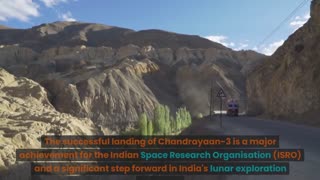 2:26
2:26
viny007
9 months agoChandrayaan 3 - India makes historic landing near Moon's South Pole.
12 -
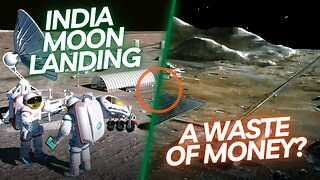 3:46
3:46
Planets Overload
9 months agoIs India Wasting Money on Lunar Exploration?
38 -
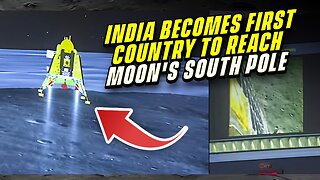 26:12
26:12
biteszHQ
9 months agoS26E103: India lands first mission on Moon - first to reach south pole
12 -
 1:43
1:43
ShadesPolitics
9 months agoIndia Moon Landing | ISRO Chandrayaan-3 | India Marked History
57 -
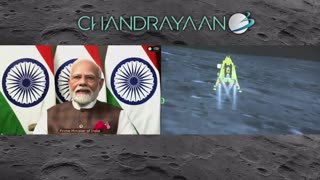 10:58
10:58
Keneci
9 months agoIndia's Chandrayaan-3 Probe Lands Near Moon's South Pole
69 -
 48:49
48:49
TakeOnTheWorldPodcast
2 months agoNASA's Historic Moon Mission: Odysseus Rover's Journey to the Lunar South Pole 🌕
42 -
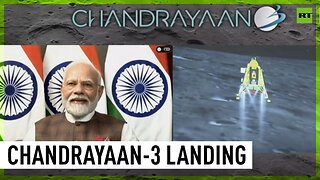 0:22
0:22
RT
9 months agoIndia’s Chandrayaan-3 lands on the Moon
3.68K32 -
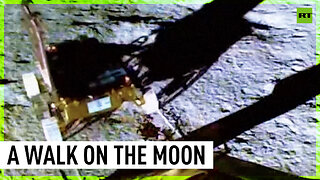 0:36
0:36
RT
9 months agoIndian Moon lander beams back first images
4.7K74 -
!["India's Remarkable Moon Landing - [Date]"](https://hugh.cdn.rumble.cloud/s/s8/6/4/H/y/-/4Hy-l.0kob.jpg) 5:25
5:25
Qasimali7292
9 months ago"India's Remarkable Moon Landing - [Date]"
14 -
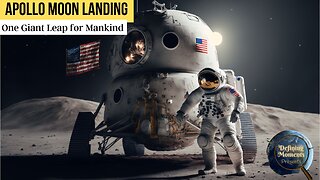 4:32
4:32
Defining Moments
1 year agoNASA's Apollo 11 Mission: The First Moon Landing Unfolded
82